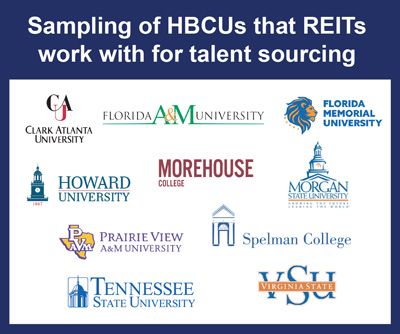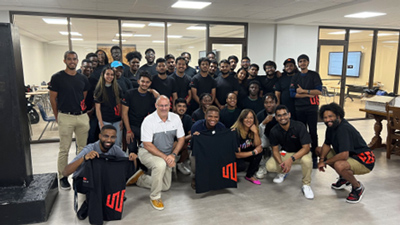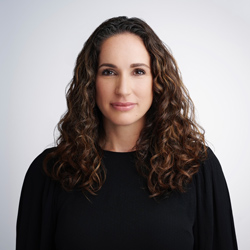Nathaalie Carey, senior vice president for human resources at Prologis, says partnering with Morehouse aligned with the logistics REIT’s larger strategic priority of diverse representation at all levels of the company. To achieve that, however, Carey underscores the need to ensure the industry remains competitive for diverse talent going forward. She notes that with fewer students going to college, graduation rates will change “drastically” by 2030. “Competing for talent in a labor market that isn’t familiar with our overall industry is a reality that we’re always grappling with,” she says.
“What we as an industry really need to be asking ourselves,” Carey says, “is, are we getting tier one talent or are we getting the remnants? We need to be out there promoting the benefits of being in our vast $4 trillion industry.”
Carey notes that Prologis is unable to hire all the top talent coming through HBCU programs. “The direct benefit for Prologis is really limited. We saw this as an investment for the entire commercial real estate industry. We see ourselves as a leader, and we want to ensure that we’re also leading in this particular arena, but we’re absolutely hoping and inviting our peers to join in and to support this kind of a program because we do think it will be a great source of talent for our industry for years to come.”
At Equinix, Terri Spencer, an engineering leader and a Fisk alumna, has worked hard to establish a strong connection between her employer and alma mater. She says that for Equinix to achieve its goal of increased diversity, it needed to move beyond the traditional ways of recruiting students.
Spencer interviews and hires Fisk students for intern positions, shares essential computer science skills, and talks to students about the various career options available in real estate. Spencer stresses the importance of establishing a personal connection to show HBCU students that “you’re really invested in teaching them about your area of expertise.”
As she speaks with Fisk students, one of Spencer’s main messages is that they need to be “open to new opportunities and new avenues that are unexpected. In many cases, whatever your major is, you can fulfill some area that would be beneficial to working in the real estate industry or a company that is related to real estate.”
Sector Level Approach
In addition to the work individual REITs are undertaking to make connections with HBCUs, a wider, sector-level approach has been adopted by the American Hotel & Lodging Association (AHLA) Foundation.
Last year, the AHLA Foundation began to provide travel scholarships for HBCU students to attend major industry investment conferences. The opportunity to expand the program, and formally connect students with REITs, emerged after it received an inaugural grant from Nareit’s Dividends Through Diversity, Equity & Inclusion (DDEI) Giving Campaign in late 2023.
“The challenge that the hospitality industry as a whole has is the current lack of representation. It’s very hard for a young person to envision themselves in a place where they don’t see anyone like them,” says Anna Blue, president of the AHLA Foundation.
“We have to move away from hiring and promoting people who look like us, talk like us, think like us, act like us, and really understand what we are creating and the future of work and the importance of diversity. As an industry, I believe we want to be a place where diverse students want to build a career, but we have to show them that it’s possible,” she adds.
Blue says the Nareit grant will provide “an opportunity to really show HBCU students the types of careers that are available that they may not even be thinking of.” She notes that there has been somewhat of a divide between students at prestigious hospitality programs and those at HBCUs, with industry traditionally tapping the former for corporate positions and the latter for operational talent.
“There’s still a bias that exists on who should be serving in what role. I think that this is a great opportunity not only for us to show the students what’s available to them in the commercial real estate industry, but also to show REITs what type of talent exists at HBCUs. We’re really excited about that,” Blue says.
As a result of the Nareit grant, a cohort of HBCU students will attend the Hunter Hotel Investment Conference held in Atlanta in March. Blue stresses the importance of attending such events. “Those connections turn into internships, which turn into jobs, which turn into a career. So, it’s critical. There’s nothing that happens in the classroom, no matter how incredible the classroom is, that can replicate that real life experience.”
Ayris T. Scales, Nareit’s senior vice president for social responsibility and global initiatives, says the AHLA Foundation’s work “speaks directly to the mission of the Nareit Foundation and its goal of working collectively to close systemic gaps. We are excited to see the continued connections forged between lodging REITs and top talent from HBCUs in the years ahead.” Scales adds that having attended Clark Atlanta University, she is particularly aware of the need to educate students about career opportunities that might otherwise be overlooked.
HBCU Alums and their REIT Experiences
HBCU graduates already make strong contributions within the REIT industry, and that is only expected to increase in years to come. Their insights into how REITs and HBCUs can continue to work together to achieve shared goals are particularly useful.
Danielle Moore, a retail lease associate at Camden Property Trust (NYSE: CPT) and graduate of Prairie View A&M University, points out that a large percentage of HBCU students are the first in their family to have the opportunity to attend an institution of higher learning, and as a result are entering the college experience with limited information. “Most people know the basics about commercial real estate, but there are so many other career opportunities available…students just need a pipeline on how to get there.”
At RLJ Lodging Trust (NYSE: RLJ), Jasmyne Smith, a financial analyst with an MBA and bachelor’s degree from Hampton University, said it’s important for HBCU students and graduates to familiarize themselves with REIT and CRE career opportunities “because we should not be, nor want to be, confined to certain industries and career paths out of fear of being uncomfortable.”
Smith says more efficient outreach to HBCUs is “a great step towards diversifying the real estate industry and can help drive our culture and people to inquire about non-traditional roles that utilize and encourage our talents, simultaneously meeting our own needs and passions.”
Partnerships between REITs and HBCUs “would give our community a fair and equal chance to elevate ourselves and expand net worth and networks by just getting a foot in the door,” she adds.
Kraig Golden, a Howard University graduate and financial analyst at RLJ, says progress is “absolutely being made in diversifying the industry, and it is important to continue to push the envelope. A motto that I have witnessed firsthand from the REIT/CRE industry is to not only pay it back, but to pay it forward.” He adds that “many of my co-workers look like me and share similar experiences in their respective journeys. This is out of the ordinary, yet incredibly invaluable.”
Related Resources:
Editor’s Note: This article is a part of Nareit’s Black History Month coverage. Read more about how REITs are recognizing Black History Month with their employees and in their communities.





